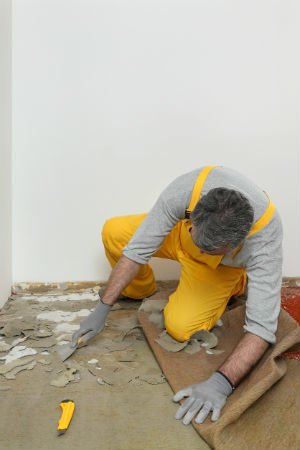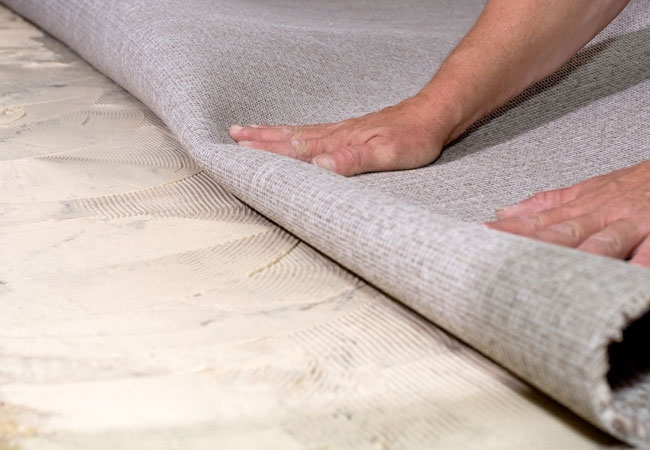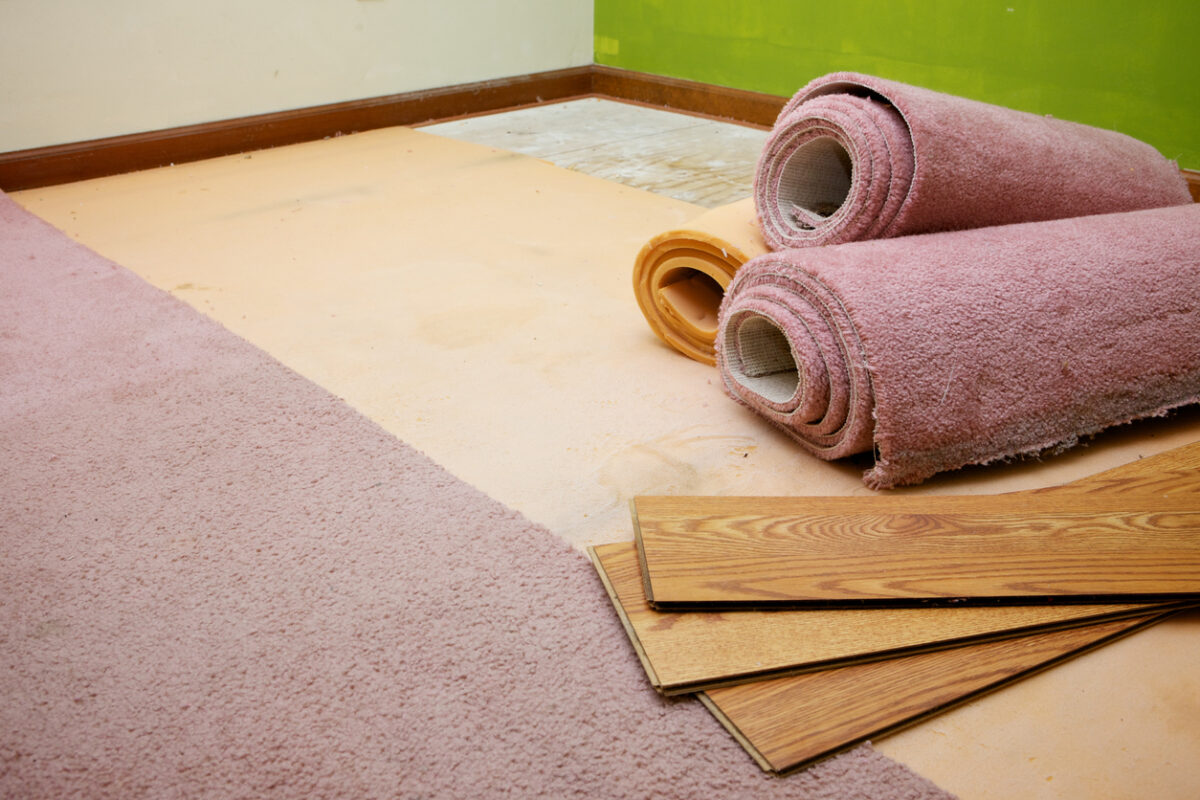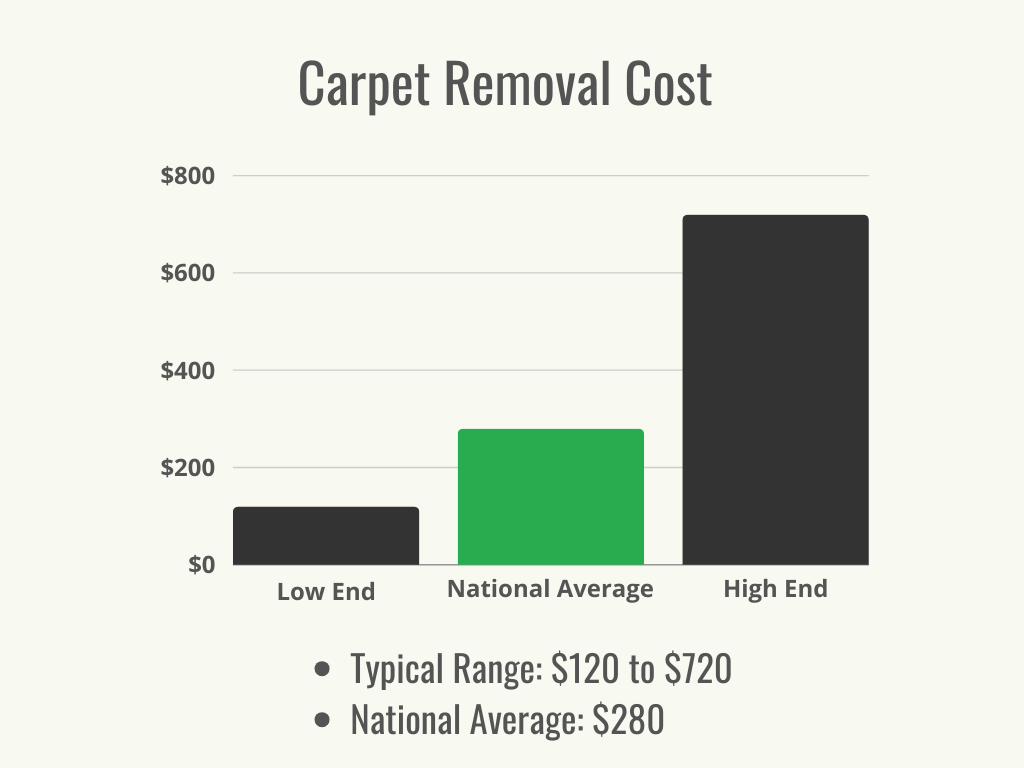We may earn revenue from the products available on this page and participate in affiliate programs. Learn More ›
Highlights
- The typical range for carpet removal cost is $120 to $720 with a national average of $280.
- Cost factors for carpet removal include room size and shape, carpet location, installation method, labor, and disposal of old carpet.
- Carpet removal may be necessary if the old carpet has visible wear and tear, stains, smells, damaged padding, is aging, residents are having allergy symptoms, or the carpet has been affected by mold and mildew.
- While a homeowner could remove carpet themselves, professionals have the tools and equipment to get the job done efficiently without damaging the walls and subfloor. They’ll also be able to dispose of the old carpet properly.
Is your carpet old, stained, worn, and dingy? If so, it’s time to get rid of it and install new flooring. Some homeowners decide on replacing it with new carpeting, while others may choose to install hardwood or laminate flooring. The first step is to remove the old carpet. According to Angi, carpet removal cost can range from $120 to $720, with the national average at $280. A contractor typically charges between $1 and $5 per square foot for carpet removal service for a 12-by-12-foot room. This price range usually includes labor costs, cleanup, and carpet disposal cost. The pricing can differ from the national average due to the location of the carpeting, whether the carpeting has been glued down, and if the contractor charges by the step for carpet removal from stairs.
Carpet removal involves clearing the rooms of furniture, personal items, and area rugs. For those who aren’t able to move heavy items on their own, hiring movers to help can cost between $2 per square yard. The cost to dispose of carpet that’s been ripped up can cost approximately $0.40 to $0.50 per square foot, or $0.50 to $1 per square foot, including labor. Before scheduling carpet removal, homeowners will want to familiarize themselves with the factors that influence the cost to tear out carpet, the telltale signs of when carpet needs to be replaced, and important questions to ask a carpet professional regarding carpet removal.
Factors in Calculating Carpet Removal Cost

How much does it cost to remove carpet? That depends on a few factors. Prices can fluctuate from the national average due to room size and shape, carpet location, labor costs, carpet disposal, and geographic location.
Room Size and Shape
The larger the room, the more expensive tearing out carpet will be. Generally speaking, carpet removal costs about $1 to $5 per square foot. For rooms that are rectangular or square, the removal costs will be less expensive than for a room that is asymmetrical. If there are bay windows, built-ins, or odd corners, there is likely to be a higher cost for the complex job.
Carpet Location
Since every area that has carpet is a different shape, it will take different amounts of time, effort, and care to remove the carpet, which can also affect the cost. For example, the cost to replace carpet on stairs is particularly high due to the challenge of working within a small space and around the spindles. Additionally, removing carpet from stairs can be tricky if staples are involved. Some professionals charge between $2 and $20 per stair for carpet removal. Bedrooms and basements are generally a standard rectangle shape, so for those areas, carpet removal costs $0.50 to $1.50 per square foot for stapled-in carpet. All the furniture will need to be removed, and the contractor will start in a corner and work toward the center of the room. If the room is oddly shaped, it will cost extra.
Carpet Installation Method
The best carpet installation companies use two main methods for installing carpet: gluing it down or stretching it in. It’s generally more time-consuming to remove carpet that has been glued down because the glue must be removed from the subfloor before new flooring can be installed. Removing glued-down carpet costs $3 to $5 per square foot, and removing stapled-in carpet costs $0.50 to $1.50 per square foot.
Labor
The average carpet removal prices of $1 to $5 per square foot typically include the cost of labor. Some contractors will charge a separate labor fee, so it’s a good idea to double-check the estimate or talk to the contractors regarding how labor is calculated. It’s common for carpet removal companies to charge around $60 per hour.
Geographic location affects labor prices for carpet removal. Densely populated urban areas typically have higher labor costs than suburban or rural areas. Some areas have more expensive disposal fees, and those can be added onto the estimate.
Carpet Disposal
Many of the best carpet removal services will include a disposal fee in the cost of carpet removal. Some will have the option to recycle the carpet instead of dropping it off at a landfill. If the contractor you use doesn’t have a recycling option, the Carpet America Recovery Effort (CARE) is a nonprofit organization that can help find a recycling center near you. The cost to recycle carpeting ranges from $0.05 to $0.25 per square foot. Most carpeting can be recycled to create new products, such as auto supplies, roof shingles, composite lumber, and more. Carpets that are not excessively damaged or dirty can also sometimes be donated. Otherwise, it may cost $0.40 to $0.50 per square foot or a flat fee of $75 to $150 to have the carpet taken to a landfill.
Additional Costs and Considerations
When budgeting for carpet removal costs, it’s beneficial to know about any additional costs and considerations that may affect the overall price. These can include preparation, glue removal, any needed repairs, and new flooring costs.
Room Preparation
Before carpets can be removed, all furniture and personal items need to be taken out of the room. In some instances, doors may need to be taken off their frames and baseboards may need to be removed. If professional movers are hired to remove furniture and other heavy items, it can cost around $2 per square yard.
Wet Carpet Removal
Carpet that has been affected by water damage is prone to mold and mildew, so it will probably be necessary to hire a water damage restoration company to remove it. This is especially important if the water is contaminated, such as by sewage. Removing carpet that is wet costs between $1.20 to $1.55 per square foot.
Flooring Repairs
Once the old carpet is removed, the contractor can get a good look at the floor. If repairs need to be made, they will make them at that time. Costs for repairing the subfloor can range from $2 to $10 per square foot. Replacing a subfloor will average between $3 and $10 per square foot. Replacing and installing floor trim can cost from $5.70 to $9, and joist repair costs $10 to $67 per square foot.
| Flooring Repair | Cost per Square Foot (Materials and Labor) |
| Joist repair | $10 to $67 |
| Subfloor repair | $2 to $10 |
| Subfloor replacement | $3 to $10 |
| Trim replacement | $5.70 to $9 |
New Flooring Installation
If homeowners are replacing carpet with new carpeting, carpet flooring costs between $3 and $11 per square foot installed. Homeowners can also choose to install a new flooring material, such as hardwood, laminate, vinyl, linoleum, tile, and more. Costs will depend on what material is chosen. For example, to compare carpet versus laminate costs, carpet can be slightly more expensive depending on the material and installation method. On the other hand, porcelain tile can cost as much as $65 per square foot to install.
| Flooring Material | Installation Cost per Square Foot (Materials and Labor) |
| Carpet | $3 to $11 |
| Ceramic tile | $3 to $5 |
| Laminate | $3 to $8 |
| Porcelain tile | $13 to $65 |
| Vinyl | $2 to $7 |
| Wood | $6 to $12 |

Carpet Removal Cost by Type of Carpet
The cost to rip up carpet depends heavily on the type of carpet and its location. A basic carpet in a regular-shaped room will generally cost less to remove than a carpet that’s been glued down or one that’s been laid in a less accessible place such as on a set of stairs or in a basement.
| Carpet Type | Removal Cost per Square Foot (Materials and Labor) |
| Basement carpet | $1 to $1.50 |
| Carpet and pad | $0.50 to $1.50 |
| Glued carpet | $3 to $5 |
| Stair carpet | $2 to $20 per stair |
| Stapled carpet | $0.50 to $1.50 |
| Wall-to-wall carpet | $0.50 to $5 |
Basement Carpet
The cost to remove carpet from a basement is $1 to $1.50 per square foot. Many homeowners prefer not to have carpet in the basement due to the damp nature of the area. If a home has issues with mold and mildew, carpeting is not recommended for the basement.
Carpet and Pad
Carpet and pad removal costs range from $0.50 to $1.50 per square foot. This price generally includes disposal costs and labor fees.
Glued Carpet
It’s common for carpet to be glued down when staples and tack strips cannot be used, such as on a concrete floor. Contractors will charge extra to remove a glued carpet since it takes more time and effort for removal. Costs can range from $3 to $5 per square foot.
Stair Carpet
The cost to remove carpet from stairs can range from $2 per step on the low end to $20 per step on the high end. Carpet removal from stairs is more time-consuming since each step needs to be completed one at a time. Some steps can be oddly shaped and have more corners, which will result in additional labor costs.
Stapled Carpet
If carpet is not glued down, the alternative is stretching it across the room and stapling it to the subfloor at various points. Removing stapled carpet is a less expensive process that costs about $0.50 to $1.50 per square foot.
Wall-to-Wall Carpet
Wall-to-wall carpet removal costs $0.50 to $5 per square foot. Costs will ultimately depend on whether the carpet was glued or stapled.

Do I need to remove my carpet?
Regular vacuuming and cleaning maintenance can extend the life of carpeting, but eventually the moment comes when it’s time to replace it. If the carpet has worn spots, rips, tears, and stains a professional carpet cleaning service just can’t eliminate, it’s time for a replacement. There are a few telltale signs that it’s time to remove that old carpet and replace it.
Wear and Tear
Matted fibers, tears, rips, worn spots, and carpet shedding are all signs that the carpet needs to be removed and replaced. On average, carpets last between 5 and 15 years, depending on foot traffic and frequency of vacuuming and cleaning.
Stains and Smells
Stains and discoloration from spilled food, drinks, pet accidents, and more can get ground into carpet fibers. The older the stains are, the more set in they become, and they are immune to even the best carpet cleaners for the home. If the carpet has an offensive odor, it may be eliminated by a professional cleaning, but if the smell has penetrated deep into the padding and subfloor material, the only solution would be to remove the carpet and replace it. For reference, professional carpet cleaning costs about $122 to $235 when a homeowner hires one of the best carpet cleaning services (such as Stanley Steemer or Oxi Fresh).
Damaged Padding
The layer of carpet padding supports the carpet and cushions the floor to make it comfortable to walk on. When it breaks down and compresses, it can make the carpet uneven and cause wrinkles. A well-padded carpet acts as a sound buffer and can improve the insulation of the room.
Age
Most carpets last between 5 and 15 years, depending on frequency of care, the amount of foot traffic, and the amount of humidity in the air. If the carpet is shedding, faded, worn, matted, wrinkled, or has compressed padding, these are all signs of an old carpet.
Worsening Allergy Symptoms
Carpets trap dirt, debris, bacteria, mold, dust mites, pollen, and pet dander. These can trigger allergy and asthma symptoms when they’re allowed to stay in the carpet fibers. Regular vacuuming, cleaning, and disinfectant use can eliminate some of these triggers, but if someone keeps having allergy or asthma attacks when in a room with a carpet, the carpet may be to blame.
Water Damage or Mold
Water damage can cause dangerous mold and mildew growth in the carpet fibers and in the padding underneath. If clean water from a burst pipe or sink malfunction soaks a carpet, using a water extractor to remove the water and fans to dry the area may stave off carpet replacement. If gray water from a dishwasher or washing machine has damaged a carpet, it’s recommended to replace the padding and, if possible, extract the water from the carpet and lay it back down. For black-water damage, or water that is unsanitary, such as from a clogged toilet or a broken sewer line, both the padding and carpet will need to be replaced as soon as possible.

Carpet Removal: DIY vs. Hiring a Professional
While it doesn’t require specialized skills, learning how to remove carpet isn’t as easy as it looks. DIYers who wish to remove their own carpeting to save on the cost of carpet replacement will want to keep in mind that it is a labor-intensive and time-consuming project. There are also some tools required to remove carpeting successfully. These can include a pry bar, utility knife, pliers, vice grips, respirator mask, safety goggles, gloves, heavy-duty trash bags, claw hammer, and a large vehicle for transporting the carpet to a disposal site. If the carpet has been glued down, a scraper, chemical glue remover, and a floor sander will be needed. The strenuous job doesn’t end when the carpet is ripped up from the floor—the carpeting will need to be removed from the house and transported to a disposal or recycling site. Homeowners who have previous experience with carpet removal will sometimes opt to tackle the job on their own, but many think the $1 to $5 per-square-foot price for removal and disposal is worth it.
How to Save Money on Carpet Removal Cost
Budgeting for carpet removal costs can be tough, and the additional fees associated with the project can quickly add up. Here are a few ways to save without compromising on quality.
- Get multiple quotes. Get at least three quotes from reputable carpet professionals in your area.
- Clear the rooms yourself. Moving the furniture and personal items out of the rooms on your own can eliminate additional costs for professional movers.
- Use the same company. Using the same company to remove the old carpet and install the new flooring can reduce costs.
- Be up front. Explaining the condition of the carpet, padding, flooring, and subfloor can help a carpet professional provide an accurate estimate.
- Ask about discounts. Some carpet companies will offer discounts and deals during their slower months.
Questions to Ask About Carpet Removal
Asking the right questions about carpet removal can minimize miscommunication and help homeowners find the right professional for the job. Here are some questions to ask a carpet professional about carpet removal costs.
- Are you licensed and insured?
- Do you have workers’ compensation coverage?
- Will you provide references?
- How do you charge for carpet removal?
- How much to remove carpet and install hardwood flooring?
- How much to remove carpet and install laminate flooring?
- How much do you charge per step?
- What is your furniture-moving fee?
- Do you offer recycling for the old carpet?
- Do you charge extra for cleanup?
- What guarantees do you offer?
- Where can I leave a review?
FAQs
As with most home projects, there are quite a few things to know before ripping up carpet. Here are a few frequently asked questions about removing carpet to help homeowners find the best professional for the job.
Q. How do I know if I should repair, clean, or remove and replace my carpeting?
If the carpet is more than 10 years old or has stains that won’t budge, or if it has offensive odors that won’t go away or has rips, tears, and worn spots, it’s time for a replacement. Some carpets that have small holes may be able to be repaired (carpet repair costs around $205 on average), but if the carpet has numerous signs of aging, water damage, or mold growth, those are signs that point to carpet removal.
Q. How can I find cheap carpet removal companies or services?
Many homeowners search online to find reviews and recommendations for carpet removal companies in their area.
Q. How much do carpet removers charge to move furniture?
The average price for furniture removal is $2 per square yard. Many times carpet removers might move a small item or two for free, but moving furniture and other items back and forth while removing the carpet will result in additional costs.
Q. How much does it cost to pull up commercial carpet?
The price to remove commercial carpet can be $1 per square foot, including labor, haul away, and disposal costs. Contractors often reduce rates for larger commercial carpet removal projects
Q. Is it worth removing a carpet myself?
If you have the experience and the tools and understand how to remove carpeting yourself, it could be a DIY project. It’s recommended to leave carpet removal to the pros to avoid the strenuous, labor-intensive, and time-consuming project.
Sources: Angi (1 and 2), Fixr, Thumbtack, HomeAdvisor


